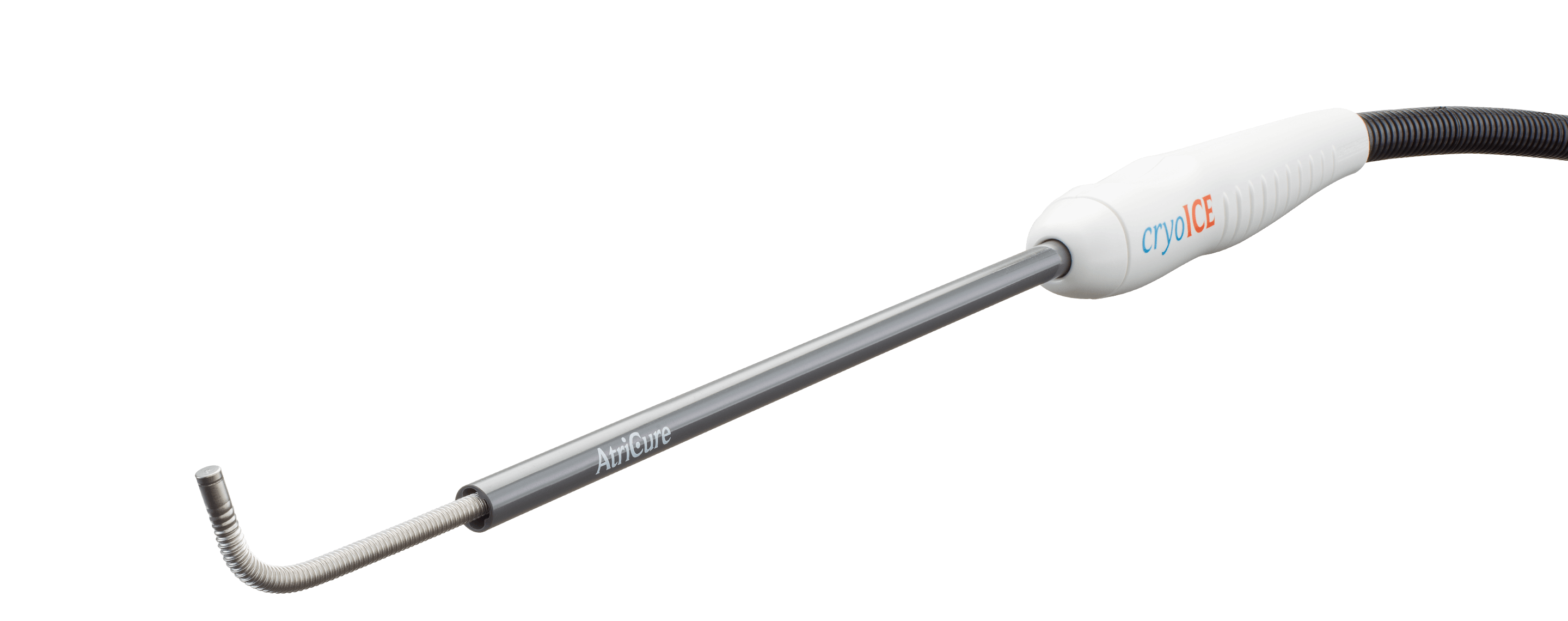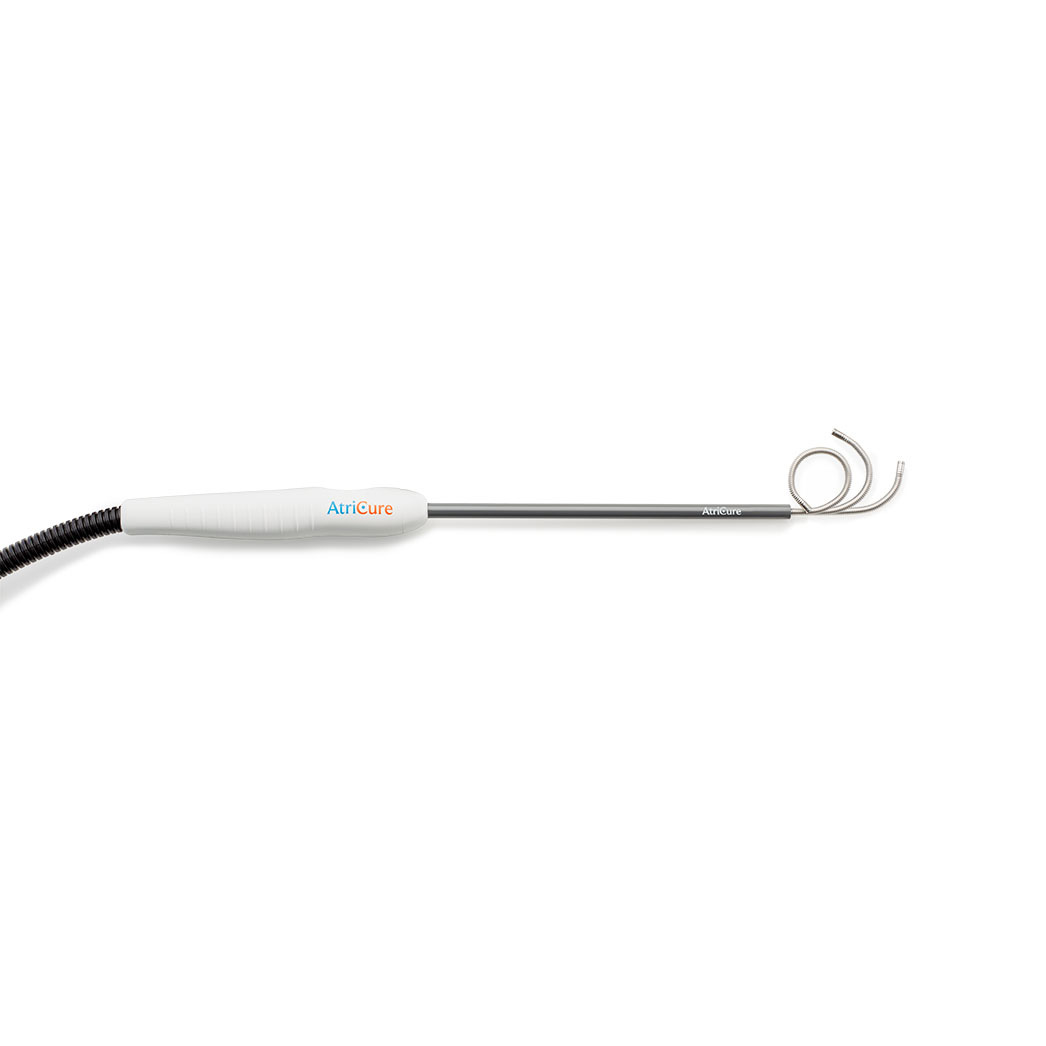- Healthcare Professionals
- Patients & Caregivers
- About AtriCure
- Canada, Central & South America


The cryoFORM probe builds off of AtriCure’s core strengths in cryoablation technology, leveraging such features as thermal capacity to remove heat and Active Defrost, which allows the probe to be safely and quickly detach while maintaining the tissue’s frozen state.
Removes Heat Faster1 / Stays Frozen Longer
1 / Fast Performance
cryoICE is quick to achieve lethal temperatures and maintains that temperature consistently along the probe length. The probe / tissue surface temperature is actively measured through a thermocouple feature.
2 / Superior Science
cryoICE has superior work capacity. Nitrous Oxide (N2O) has a higher heat absorption capacity than Argon.2
3 / Innovative Ergonomics
cryoICE has a retractable handle to expose the active probe length. In addition, its flexible tube set allows for a tight bending radius, and the ergonomic handle can adjust to multiple hand positions.
4 / Active Defrost
Active Defrost allows the probe to be quickly detached maintaining the tissue’s frozen state.
"Slow thawing of the frozen tissue is a prime destructive factor and is a more important mechanism of cell death in cryosurgery than is rapid cooling. The rate of thawing should be as slow as practical, and is best done by allowing the tissues to thaw with no assistance by heating. Rapid thawing increases the chance of cell survival, which has long been known in the treatment of frostbite."3
| Product Code(s): |
|---|
CRYOF |
The cryoFORM probe builds off of AtriCure’s core strengths in cryoablation technology, leveraging such features as thermal capacity to remove heat and Active Defrost, which allows the probe to be safely and quickly detach while maintaining the tissue’s frozen state.
Removes Heat Faster1 / Stays Frozen Longer
1 / Fast Performance
cryoICE is quick to achieve lethal temperatures and maintains that temperature consistently along the probe length. The probe / tissue surface temperature is actively measured through a thermocouple feature.
2 / Superior Science
cryoICE has superior work capacity. Nitrous Oxide (N2O) has a higher heat absorption capacity than Argon.2
3 / Innovative Ergonomics
cryoICE has a retractable handle to expose the active probe length. In addition, its flexible tube set allows for a tight bending radius, and the ergonomic handle can adjust to multiple hand positions.
4 / Active Defrost
Active Defrost allows the probe to be quickly detached maintaining the tissue’s frozen state.
"Slow thawing of the frozen tissue is a prime destructive factor and is a more important mechanism of cell death in cryosurgery than is rapid cooling. The rate of thawing should be as slow as practical, and is best done by allowing the tissues to thaw with no assistance by heating. Rapid thawing increases the chance of cell survival, which has long been known in the treatment of frostbite."3
| Product Code(s): |
|---|
CRYOF |
Indication (Argentina, Australia, Brazil, Canada, Chile, Colombia, EU Region, Hong Kong, Israel, Korea, Kuwait, New Zealand, Serbia, Saudi Arabia, Singapore, South Africa, Taiwan, UAE, UK)
The cryoICE cryoFORM cryoablation probe is indicated for use in the cryosurgical treatment of cardiac arrhythmias by freezing target tissues, creating an inflammatory response (cryonecrosis) that blocks the electrical conduction pathway.
Indication (Japan)
This device is a surgical system intended for achieving coagulation of targeted cardiac tissues by contact (indirect contact to cryogen) to tip of probe (frozen tip) refrigerated by cryogen.


The information on this page is intended for Healthcare Professionals. If you are a Patient or a Caregiver, please visit the 'Patients and Caregivers' page.
Click "Agree" to confirm you are a Healthcare Professional.
The information on this page is intended for Healthcare Professionals. If you are a Patient or a Caregiver, please visit the 'Patients and Caregivers' page.
Click "Agree" to confirm you are a Healthcare Professional.
The information on this page is intended for Patients and Caregivers. If you are a Healthcare Professional, please visit the 'Healthcare Professionals' page.
Click "Agree" to confirm you are a Patient or a Caregiver.
You are leaving the Asia Pacific site of AtriCure.com and entering an AtriCure site intended for users in USA.
You are leaving the Asia Pacific site of AtriCure.com and entering an AtriCure site intended for users in Canada, Central & South America.
You are leaving the Asia Pacific site of AtriCure.com and entering an AtriCure site intended for users in Europe & Middle East.
You are leaving the Europe & Middle East site of AtriCure.com and entering an AtriCure site intended for users in USA.
You are leaving the Europe & Middle East site of AtriCure.com and entering an AtriCure site intended for users in Canada, Central & South America.
You are leaving the Europe & Middle East site of AtriCure.com and entering an AtriCure site intended for users in Asia Pacific.
You are leaving the Canada, Central & South America site of AtriCure.com and entering an AtriCure site intended for users in USA.
You are leaving the Canada, Central & South America site of AtriCure.com and entering an AtriCure site intended for users in Asia Pacific.
You are leaving the Canada, Central & South America site of AtriCure.com and entering an AtriCure site intended for users in Europe & Middle East.